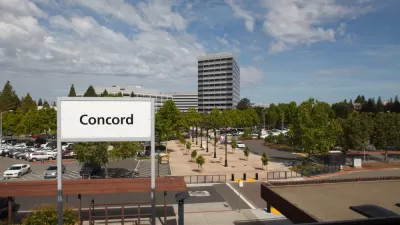Despite a dramatic decline in the number of, and attendance at, conventions nationwide, cities across America are investing their limited resources in building and upgrading convention centers. Fred A. Bernstein explores the irony.
It seems as though cities across America, large and small, haven't received the message about the precipitous decline in the nation's convention business. According to Bernstein, "In the last year alone, Indianapolis and Philadelphia have opened
sprawling new centers, while plans for such facilities are being
floated in Baltimore, Los Angeles, San Francisco, Seattle, and Boston...It's much the same in smaller cities: Spokane's convention center,
enlarged only six years ago, is being readied for a new, $60 million
expansion."
So what gives? "Loren G. Edelstein, editor of Meetings and Conventions magazine,
says that 'while a convention center itself might not be making money,'
it may be paying for itself with revenue the facility brings to the
city in other ways."
"But such claims are difficult to prove. Critics like
Professor Sanders believe the convention center boosters are making a
buyer's market-in which supply now far outstrips demand-even more
unbalanced. Though the decline in attendance began before 2008, he
says, 'the recession worsened an already bad situation.'"
FULL STORY: Straying from Convention

Planetizen Federal Action Tracker
A weekly monitor of how Trump’s orders and actions are impacting planners and planning in America.

Chicago’s Ghost Rails
Just beneath the surface of the modern city lie the remnants of its expansive early 20th-century streetcar system.

San Antonio and Austin are Fusing Into one Massive Megaregion
The region spanning the two central Texas cities is growing fast, posing challenges for local infrastructure and water supplies.

Since Zion's Shuttles Went Electric “The Smog is Gone”
Visitors to Zion National Park can enjoy the canyon via the nation’s first fully electric park shuttle system.

Trump Distributing DOT Safety Funds at 1/10 Rate of Biden
Funds for Safe Streets and other transportation safety and equity programs are being held up by administrative reviews and conflicts with the Trump administration’s priorities.

German Cities Subsidize Taxis for Women Amid Wave of Violence
Free or low-cost taxi rides can help women navigate cities more safely, but critics say the programs don't address the root causes of violence against women.
Urban Design for Planners 1: Software Tools
This six-course series explores essential urban design concepts using open source software and equips planners with the tools they need to participate fully in the urban design process.
Planning for Universal Design
Learn the tools for implementing Universal Design in planning regulations.
planning NEXT
Appalachian Highlands Housing Partners
Mpact (founded as Rail~Volution)
City of Camden Redevelopment Agency
City of Astoria
City of Portland
City of Laramie





























